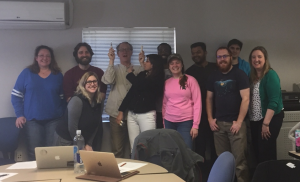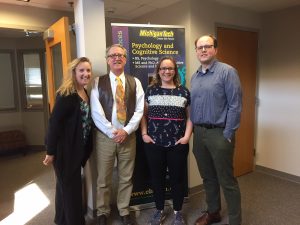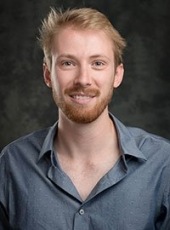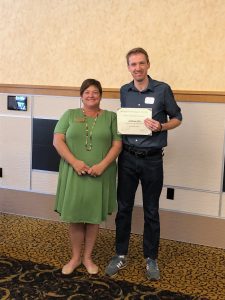 osh Ellis was recognized on April 24 by CLS Department Chair Susie Amato-Henderson at the annual Dean’s teaching showcase luncheon. College of Sciences and Arts Dean Bruce Seely selected Ellis, Assistant Professor in the Department of Cognitive and Learning Sciences (CLS) for his synthesis between research and teaching.
osh Ellis was recognized on April 24 by CLS Department Chair Susie Amato-Henderson at the annual Dean’s teaching showcase luncheon. College of Sciences and Arts Dean Bruce Seely selected Ellis, Assistant Professor in the Department of Cognitive and Learning Sciences (CLS) for his synthesis between research and teaching. osh Ellis was recognized on April 24 by CLS Department Chair Susie Amato-Henderson at the annual Dean’s teaching showcase luncheon. College of Sciences and Arts Dean Bruce Seely selected Ellis, Assistant Professor in the Department of Cognitive and Learning Sciences (CLS) for his synthesis between research and teaching.
osh Ellis was recognized on April 24 by CLS Department Chair Susie Amato-Henderson at the annual Dean’s teaching showcase luncheon. College of Sciences and Arts Dean Bruce Seely selected Ellis, Assistant Professor in the Department of Cognitive and Learning Sciences (CLS) for his synthesis between research and teaching.![]() Students enrolled in PSY 3001 presented their research projects in the Meese 110 classroom on Thursday, April 26. While promoting the event, Dr. Hungwe expressed that “the mini-conference has a really great set of projects that the students conceived of, researched, designed, obtained IRB approval for, carried out, analyzed, and are finally presenting. Also, several members of the class are graduating, so this will be a great chance to see how far they’ve come.”
Students enrolled in PSY 3001 presented their research projects in the Meese 110 classroom on Thursday, April 26. While promoting the event, Dr. Hungwe expressed that “the mini-conference has a really great set of projects that the students conceived of, researched, designed, obtained IRB approval for, carried out, analyzed, and are finally presenting. Also, several members of the class are graduating, so this will be a great chance to see how far they’ve come.”
 Over the past 10 years I’ve taken my love of teaching chemistry to the community and volunteer bringing hands-on learning to schools, organizations, libraries, the children’s hospital, and television science segments on ABC affiliate stations (WZZM 13 in Grand Rapids, Michigan and ABC7 in Fort Myers, Florida). I present a blend of smart and entertaining hands-on science activities that motivate kids to continually question and investigate their world. My encouragement is to never stop being curious and never stop seeking the answers.
Over the past 10 years I’ve taken my love of teaching chemistry to the community and volunteer bringing hands-on learning to schools, organizations, libraries, the children’s hospital, and television science segments on ABC affiliate stations (WZZM 13 in Grand Rapids, Michigan and ABC7 in Fort Myers, Florida). I present a blend of smart and entertaining hands-on science activities that motivate kids to continually question and investigate their world. My encouragement is to never stop being curious and never stop seeking the answers.
In addition, I utilize mobile technology in my teaching in the chemistry classroom, laboratory, and science outreach. I’ve authored several technology grants and have led several workshops at local colleges and schools teaching on the integration of mobile technology in the classroom.
I started into the education program at MTU as a junior as a result of two friends majoring in mathematics that convinced me to join them. I really wasn’t expecting to go into teaching. I loved chemistry and was planning on a career as a research chemist. Standing in front of a group of people was always so fearful to me. As I got farther into the education program, I started to discover how much I was enjoying my classes. It got me thinking how many college chemistry professors really don’t know how to teach. This motivated me more in the education program at MTU. I started to feel like I could be that change and teach chemistry better than it was taught to me. The education program at MTU gave me that “face your fear and find your passion” moment. I faced my fear of being in front of a group of people and found a passion that made everyday of going to work since, a joy.
My advice to current teachers is to do what you love. If you don’t find a love in your subject or in teaching it, don’t force it. The teaching world is filled with too many who complain about teaching, students, and the hard work for so little pay. Yes, the pay is little and yes, the work is hard… but if you love it, you will not regret a day of your career choice. You will make a difference to the world because you’re giving the good part of yourself, the happy part.
Always be yourself and do not teach a particular style just because that’s how you were taught. Teaching is always evolving and be ready for constant change. The best experiences you can bring to the classroom are your life experiences. Use your personality and life experiences to make the best environment for learning. In the early years of your teaching, keep learning more hands-on about your subject and education. Substitute teach, participate in research, attend workshops and seminars, become active at your school. And if you have time, volunteer in your community.
If you’re enjoying teaching, then your students are probably enjoying learning. And if your nervous, that is good because nerves means you care. The day I’m not nervous or a bit scared to go into a classroom might be the day I might be ready to retire from teaching.
To learn more, check out Chemical Kim’s social media sites: www.youtube.com/scistudio, www.chemicalkim.com
Dr. Robert Hoffma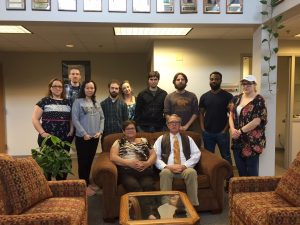 n, world renowned expert on cognitive systems engineering and Senior Scientist at the Institute for Human Machine Cognition (IHMC), gave a talk on April 9, entitled, “Integrated Model of Macrocognition” for students and faculty in Cognitive and Learning Sciences and Human Computing Center at MTU. IHMC, based in Pensacola, Florida, is a leading organization in research to understand and extend human capabilities and technologies.
n, world renowned expert on cognitive systems engineering and Senior Scientist at the Institute for Human Machine Cognition (IHMC), gave a talk on April 9, entitled, “Integrated Model of Macrocognition” for students and faculty in Cognitive and Learning Sciences and Human Computing Center at MTU. IHMC, based in Pensacola, Florida, is a leading organization in research to understand and extend human capabilities and technologies.
Dr. Hoffman is working with MTU Faculty, Dr. Shane Mueller on a DARPA project to develop explainable AI.
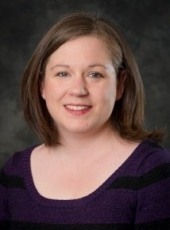 Amy Lark, Assistant Professor in Applied Science Education, was one of the Michigan Tech faculty members to receive an award exceeding $5,000 from the Michigan Space Grant Consortium for her program “Teacher Training: The Next Generation Science Standards in Theory and Practice”. Click here to see a full list of recipients.
Amy Lark, Assistant Professor in Applied Science Education, was one of the Michigan Tech faculty members to receive an award exceeding $5,000 from the Michigan Space Grant Consortium for her program “Teacher Training: The Next Generation Science Standards in Theory and Practice”. Click here to see a full list of recipients.
NASA implemented the National Space Grant College and Fellowship Program in 1989 to provide funding for research, education and public outreach in space-related science and technology. The program has 52 university-based consortia in the United States and Puerto Rico.
As an affiliate of the Michigan Consortium, Michigan Tech has been an active participant in MSGC for approximately 20 years. MSGC funding is administered through MTU’s Pavlis Honors College. For more information, contact Paige Hackney in the Pavlis Honors College, call 7-4371, or visit the MSGC website.
Myounghoon “Philart” Jeon (CLS/CS) and his colleague Paul Fishwick guest-edited a special issue on “Arts, Aesthetics and Performance in Telepresence” in the journal Presence: Teleoperators and Virtual Environments.
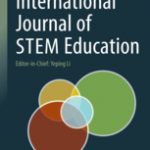 Drs. Dare and Ellis of the Teacher Education program in Cognitive and Learning Sciences have published new research in the International Journal of STEM Education. Along with their co-author, Dr. Gillian Roehrig at the University of Minnesota, Drs. Dare and Ellis explore middle school teachers’ experiences in their first-time implementation of integrated STEM curriculum units. This article is publicly available through Open Access.
Drs. Dare and Ellis of the Teacher Education program in Cognitive and Learning Sciences have published new research in the International Journal of STEM Education. Along with their co-author, Dr. Gillian Roehrig at the University of Minnesota, Drs. Dare and Ellis explore middle school teachers’ experiences in their first-time implementation of integrated STEM curriculum units. This article is publicly available through Open Access.
Michigan Technological University’s transdisciplinary researchers reach across disciplines and institutional boundaries to solve complex problems that are bigger than a single specialized field.
Kelly Steelman, an assistant professor of cognitive & learning sciences, says diversity is good for problem-solving. If you only have a spoon, the only food you’ll want to eat is soup.
“The more tools you have available to your research team, the more likely you are to consider a variety of solutions and not get stuck always trying to use the same approach to every problem… The more perspectives we bring to the table, the better opportunity we have to create innovative and transformative solutions.”
Read the full story on the Michigan Tech News Website.
Elizabeth Veinott, Associate Professor in Cognitive and Learning Sciences, along with graduate student Katy Roose, recently presented their games for learning paper in the beautiful city of Amsterdam, Netherlands. The paper, Roller coaster park manager by day problem solver by night: Effect of video game play on problem solving, was included at the CHI-Play conference.
